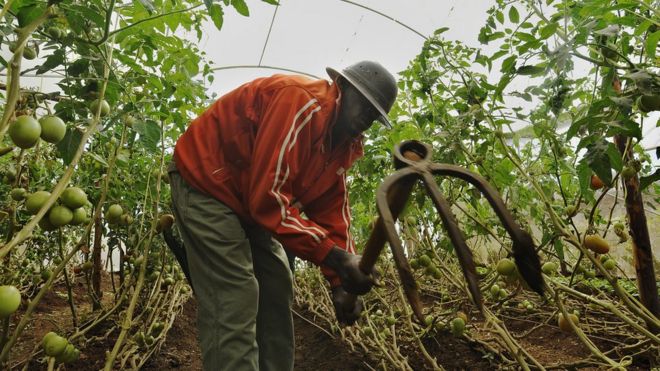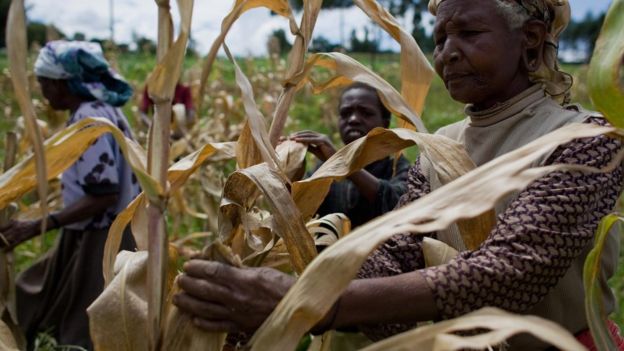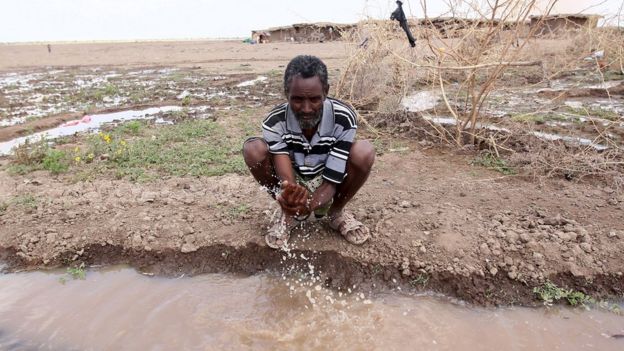- 9 April 2016
- Africa
-
(아프리카) 문자로 일기예보 전하는 아프리카의 농업보험국제문제/아프리카 2016. 4. 11. 01:24
출처: http://www.bbc.com/news/world-africa-35942844
Mobile drought insurance to protect Africa's farmers 농업보험이 문자로 일기예보 전하는 써비스 아프리카 농부들을 지켜준다
 Getty Images
Getty ImagesA mobile insurance scheme to help small-scale farmers in Kenya ensure their agricultural produce against drought and other natural disasters is spreading to other parts of Africa, as Neil Ford explains.
A greater proportion of sub-Saharan Africans work in agriculture than anywhere else on the planet but only 6% of the population of Africa and the Middle East have any form of agricultural insurance.
"The insurance man" was a feature of many Western countries in past decades. Local agents collected tiny sums on a weekly basis to provide cover against long-term illness, funeral costs and unemployment. (feature: 특징, 특성)
Kenya has now adopted this model for the 21st Century via mobile handsets.
Farmers with as little as one acre of land can insure themselves against extreme weather events.
They pay a 5% surcharge on purchases of fertilisers and seeds, which is registered with an insurance company, which in turn communicates with farmers via text message. (surcharge: 추가요금)
The first product was introduced on a small scale in Kenya in 2009 but has become increasingly popular. There are now no claim forms, as claims are automatically triggered by data from local weather stations and distributed in the form of mobile money. (claim form: 청구서) (trigger: 방아쇠, 방아쇠를 당기다. 촉발하다. 작동시키다)
This makes the system cheaper to operate and removes the possibility that farmers will make incorrect claims.
 AFP
AFPKenya is seen as a leader in mobile financing in Africa Safaricom is the market leader in Kenya at present but UAP Insurance is this year launching in Democratic Republic of Congo, Rwanda, Tanzania and Uganda. Such insurance aims to help smallholders to even out the good and bad years. (even out: 땅을 고르다)
It should also encourage farmers to invest more in their land, with some assurance that they will receive compensation if their crops fail because of poor weather. 농사실패 원인①: 나쁜 날씨
There are others reasons for crop failure, including disease and insect infestation, but drought is the most common problem. 기타 농사실패 원인②; 질병, 특정곤충의 횡횡, 기근. 가장 흔한 문제는 기근.
Kenya as a test bed 시험대 역활을 하는 케냐
First, Kenya was the birthplace of the "pay as you go" telecoms model. By allowing users to pay for call time upfront, telecoms companies were able to get around difficulties in payment collection.
Most Africans have no formal bank account and residential postal services are limited.
Then, East Africa's biggest economy spawned mobile banking. M-Pesa was launched in 2007 and now has more than 20 million users in Kenya, out of a total population of 46 million.
More recently, the solar kiosk has come to the fore. Customers pay to charge mobile phones and other devices at small kiosks fitted with a couple of solar panels. In each case, the innovation has spread to other countries.
World Bank support
Kenya is now also taking mobile insurance on to the next level.
 AFP
AFPMajority of poor Kenyans are farmers On 12 March, the Kenyan government and World Bank began to roll out the nationwide Kenya National Agricultural Insurance Program. This is a little more complicated as it uses a combination of mobile phones, crop yield data and statistical sampling.
It will also deploy GPS tracking for the first time, so cover can be provided for cattle in the north of Kenya, where drought is the biggest cause of death. Another big development is that the government will buy premiums for poor farmers from private companies.
Diarietou Gaye, the World Bank Country Director for Kenya, said: "The large majority of the poor in Kenya are farmers, so this programme has the potential to have a significant impact on Kenya's economic development.
"This programme aims at improving farmers' financial resilience to these shocks and will enable them to adopt improved production processes to help break the poverty cycle of low investment and low returns."
Ethiopian alternative
Mobile insurance is not the only innovative way of insuring farmers in Africa. Plans to insure 15 million Ethiopian smallholders were announced in early March.
 Reuters
ReutersAn El Nino-driven drought has affected many Ethiopian farmers A group of Ethiopian, Dutch and international agencies will ask farmers to pay a 10% premium on the price of all agricultural inputs, including seeds, fertiliser and pesticide.
The average Ethiopian smallholder spends 2,500 to 3,000 birr ($115-140; £80-100) per season on inputs. They will then recoup the purchase price of these products from the Ethiopian Insurance Corporation if their crops fail because of weather.
The big difference, however, is that a vegetation index long employed by aid agencies will be used to define a drought situation.
In Ethiopia, using mobile phones was not an option because the government continues to control the telecoms sector and so the country has not benefitted from the private sector-driven mobile boom experienced by most other African states.
There are just 34 handsets for every 100 Ethiopians, leaving the vast majority of farmers without any means of modern communications.
Yet Ethiopia remains an outlier in this respect and many farmers in neighbouring countries do have access to mobile phones, so they are well placed to continue to benefit from the technological experiments undertaken in Kenya.
'국제문제 > 아프리카' 카테고리의 다른 글
(아프리카) 자신의 권리를 찾기 위해 처음으로 투쟁에 나선 南아프리카人들 (0) 2016.06.15 (아프리카/탄자니아) 왜 탄자니아는 설탕이 충분하지 않은가? (0) 2016.05.22 (아프리카/나이지리아) 나이지리아 방산 비리 관련 개인 및 회사들 기소 (0) 2016.03.25 (아프리카/우간다) 우간다에는 핸드폰이 전구 보다 많을까? (0) 2016.03.25 (아프리카) 우간다 야당대표 여당의 부정선거 주장 (0) 2016.02.21